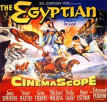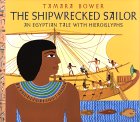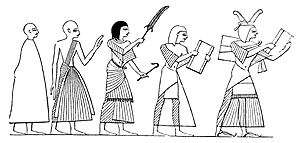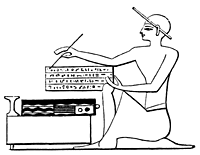
Preparing for Class:
September 27

The
Tale of Sinuhe (p. 124),
The Tale
of the Shipwrecked Sailor (p. 8), and
"The Immortality of Writers" (p. 226)
Homework
for Two:
Working with material from
the Ancient Egyptian poems we've read, develop a handbook for proper behavior
circa 1500 BCE along the banks of the Nile. You should write in the style of
a guide to conduct, either as the Egyptians would (The Wisdom of Amenemopet,
for instance) or as we would (Miss Manners, for instance).
Choose several areas of
conduct (i.e., religious practice, relations with other people, conducting one's
business, and so on) to cover in your guide and give us the word on how we might
shape ourselves into the cultural ideal of the Ancient Egyptians.
Be specific, lively and
helpful in giving your advice. You should work as a team with another student
in completing this assignment, producing a joint paper of approximately three
single-spaced or five double-spaced pages. Only one of you can upload it to
turnitin.com, but the text you upload should identify both writers. As usual
your paper should be printed in 12-pitch type (no larger), with margins of no
more than one inch. It should be spellchecked, grammar checked, proofread and
corrected, and printed on a legible printer. Finally, its pages should be stapled
or paperclipped together.
Due: Thursday, October 6
The
Tale of Sinuhe 
This tale is
one of the most famous of all ancient Egyptian works. In the 1950s, it was even
turned in a Hollywood epic film. In reading it, I'd like you to think about
the followinging ideas:
- What is Sinuhe's situation
when he first introduces himself to us in the poem? What causes it to change?
- Why does Sinuhe leave
Egypt?
- Describe his journey.
What is the significance of his crossing the Nile "in a rudderless boat"?
Are there any other indicators of his state of mind as he flees?
- Why is Sinuhe so pleased
to see Sheik Amunenshi? Does the latter's name give you any clue to why his
presence reassures Sinuhe?
- Before going further,
Sinuhe interrupts his narrative to extol the deeds of the current Pharoah
of Egypt, Senusert (aka Sesostris I), son of Ammenemes I, the Pharoah in whose
household Sinuhe served so faithfully. What are the most memorable qualities
of Senusert?
- Senusert's wife, Queen
Nofru, what actually the person Sinuhe served when he was a courtier. As you
read on, note how his relationship with her and her children is developed.
- Can you draw any conclusions
about the nature of kingship from this description?
- Scholars identify Upper
Retenu with parts of Syria and Palestine. How does Sinuhe characterize his
life in this part of the world?
- Can you see any overlaps
between Sinuhe's welcome to Upper Retenu and parallel narratives in Genesis?
- Many years after Sinuhe
settles in Upper Retenu, he is challenged to a duel by a neighboring sheik.
Some scholars see this as a story that inspired a similar one recorded in
the Tanakh, the battle between David and Goliath. Read that story (I Samuel,
Chapter 17) and be ready to compare the two.
- Immediately after his
battle with the sheik, Sinuhe starts thinking about the contrasts between
the man he was when he fled Egypt and the man he is today. In his mind, is
he guilty of something? What might it be? How has he tried to rid himself
of guilt in the intervening years?
- In sending his message
to Sinuhe, what does Pharoah Senusert emphasize? Why at this particular time
should Sinuhe return to Egypt?
- What cultural indicators
are in Senusert's message and Sinuhe's reply?
- Look for discrepancies
between the account Sinuhe originally gave of why he left Egypt and the one
he later relates to Pharoah. Can you see any rationale for the differences?
- How does Sinuhe prepare
to leave? Does his leaving seem at all casual to you?
- How is the return journey
different from his journey out of Egypt?
- Be ready to describe
Sinuhe's welcome home. What does the court's response to his current dress
and appearance tell you about the way in which Egyptians viewed neighboring
cultures?
- This narrative is sometimes
referred to as a "tomb autobiography," in which the person looks
back at his completed life from the vantage point of his tomb. If so, how
comfortable is Sinuhe going to be for eternity?
The Tale of the Shipwrecked
Sailor 
- With this story we enter
the realm of the folk or fairy tale; it opens in the middle of a conversation
between two officers just returned from an expedition to (scholars believe)
Nubia in the south. It appears that the expedition, whatever its nature, has
been unsuccessful and the leader is apprehensive about having to report that
to the King. It is his lieutenant who tells his own story in order to try
to cheer up his commander.
- What do the forces have
to be thankful for, according to the speaker?
- His story opens with
his journey to what is apparently the mines near the Red Sea at its southern
end. Though he uses the name "Great Green Sea," which ancient Egyptians
apparently used to describe both the Mediterranean and the Red Seas, the mention
of giraffes and the land of Punt seem to indicate an African destination.
- How does the trip go
wrong? Is this the fault of the sailors?
- Read carefully when the
speaker describes his landing on the deserted island (Island of the Ka). When
we get to The Odyssey, I want you to be able to compare
Odysseus's similar landings to this one. What stages does the sailor go through
in the week or so after he lands?
- Be ready to describe
the serpent. Might he better be referred to as a dragon?
- The serpent has an interestingly
poetic way of speaking; why might the author have chosen to give him these
speech patterns? What might they indicate about him and his status?
- What's the source of
the humor as the snake takes the sailor to his home?
- What does the serpent
see as the most important source of happiness for human beings? (If you've
already read The Odyssey, you might note whether Odysseus would agree.)
- Why should we believe
the serpent knows what he's talking about?
- The sailor wants to repay
the generous serpent for sparing his life and sending him home. What does
he offer and why does the serpent turn it down?
- What kind of cargo does
the sailor take back for the Pharoah? Does it tell you anything about where
this island is?
- What happened when the
sailor returned?
- Does his tale cheer up
his commander? Why or why not?
 "The
Immortality of Writers"
"The
Immortality of Writers" 
- What are the disadvantages
of being a writer?
- What are the advantages?
- Given that, why does
the speaker exhort his listener to "Be a writer!"
- Does this poem have anything
in common with the harpers' songs we read last week in terms of philosophy
of life?
- What do writers "save
for the world"? Why, then, is this poem a fitting epilogue for this book
of poems?
Return to Daily
Readings and Assignments Page
Return to Home
Page





 "The
Immortality of Writers"
"The
Immortality of Writers" 